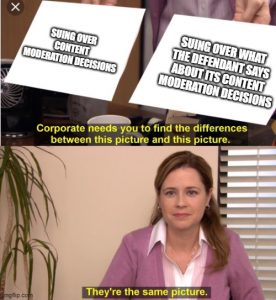First Amendment Doesn’t Apply to Descriptions of Content Moderation Practices–Bride v. Snap
Last year, the Ninth Circuit said that plaintiffs could get around Section 230 in their lawsuit against the app maker YOLO because the app maker said it would ban users for inappropriate statements and would unmask harassers.
This opinion raised numerous Section 230 jurisprudential issues. First, those kinds of statements are almost certainly not enforceable promises. Second, a more recent Ninth Circuit opinion (Doe v. Grindr) rejected a Section 230 workaround for Grindr’s statement that it provides a “safe and secure environment for its users” because the statement was “a description of its moderation policy.” So where exactly is the Ninth Circuit’s law on this topic? I don’t know.
This blog post covers the YOLO case remand after that Section 230 ruling. The ruling has several interesting angles, but I’ll focus only on the First Amendment piece.
The defendant claimed that the First Amendment barred the lawsuit “because the claims would interfere with Defendant’s First Amendment discretion to choose its own content moderation policy,” citing the O’Handley district court case. The court disagrees.
First, the court says the complaint doesn’t make it plain that “Defendant is engaged in expressive activity…Defendant does not explain how a service that ‘allows teens to chat, exchange questions and answers, and send polling requests’ is expressive in the way that Twitter is expressive.” What? To me, UGC is UGC, so this seems like a distinction without any difference. Chatting and exchanging Q&A are different from tweets…how?
Second, the court says this case involves an alleged misrepresentation, not at issue in the OHandley case, and “Defendant’s ability and intent to honor its own representations about how it would moderate its platform are separate from any First Amendment interest it may have in controlling its platform,” citing the Everyspace case.
 This position is confusing for several reasons:
This position is confusing for several reasons:
- the Everyspace opinion was itself dubious;
- representations may still be eligible for First Amendment consideration, even when they are false (see Alvarez), and even commercial speech receives First Amendment protection (reduced, but still significant);
- I think YOLO’s statements are puffery, so they don’t qualify as representations at all;
- as I explained in the YOLO Ninth Circuit ruling, there’s no meaningful difference between suing over content moderation decisions and suing over representations about content moderation decisions;
- and the net effect is that the court is saying that plaintiffs who allege defendants’ misrepresentation provides a fast lane around both Section 230 and the First Amendment.
I also think this result is plainly at odds with the NetChoice v. Bonta ruling, which said that legal obligations for services to enforce their stated policies are subject to strict scrutiny. The YOLO opinion came before the Bonta opinion, but the Bonta ruling indicates that of course the First Amendment applies. That could be a proper grounds for a reconsideration.
It’s unclear who’s paying the legal bills for YOLO’s defense, given that they went out of business a while ago. After seeing the judge’s repeated skepticism against the defense’s core points, I wonder if a change in defense strategy is in order.
Case Citation: Bride v. Snap, Inc., 2025 WL 819567 (C.D. Cal. Feb. 21, 2025)
